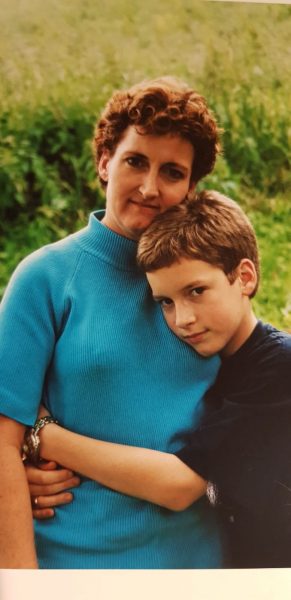Parts of this entry may be met with controversy, as you will soon see. No politics, though, I promise. You're advice on whether to edit out those parts will be very much appreciated. Erik was not at all clear about whether or not I should filter some of his volatile comments.
Channeling Transcript
Me: Okay, now what do I tell people when you’ve spent a lot of time here talking about how easy death usually is and how wonderful the afterlife can be? What’s to stop them from wanting to go there before it’s their time? I mean, you make a great case for dying. What can I tell them, Sweetie?
Erik: Well, first, Mom, you gotta define what is “before their time.”
Me: Oh, yeah, yeah, exactly. I guess what I want to know is what’s to keep people from committing suicide given you’re descriptions about Heaven, uh, when they maybe shouldn’t go that route?
(Long pause)
Me: It’s like getting off early from work when you’re not supposed to, you know? “It’s Friday; I’m leaving at two!”
Jamie (laughing): Sneaking out!
Me: Yeah.
Jamie: He has a really different tone when he’s talking right now. (pause) It’s not his, “Hey, I’m telling you a story. I’m chit-chatting.” His tone has kind of dropped a level—more sincere.
Erik: Mom, if people are at the place of suicide, and they’re romancing that idea—cuz that’s what it’s like; you have to romance it for a while before you test yourself to see if you have the strength to do it or not.
Me (somberly): Um hm.
Erik: If you find out you have the strength, I’m going to tell you right then and there, Mom, it’s not a wrong choice. I don’t know if you ever want to write that in a book.
Me: Well, should I or shouldn’t I?
Erik: I just don’t want you to catch hell, because people are going to rise up against you—humans need to have the structure and the rules. They have to be told what is right and wrong. But really, we’re supposed to do that internally for ourselves. And yes, Mom, people can be saved from suicide; people can be stopped; uh, a friend can show up and take the gun away; an unexpected person can arrive and pump their stomach of the pills they just took. Those are the moments of salvation that scream: “You have a second chance.”
Me (sadly): Yeah. How I wish…
Erik: But if you actually follow through on the suicide, and you achieve it, most of the time—I’ll say 70% of the time—you’re supposed to go. You're supposed to go. But you’re right, there’s the other 30%–that’s a loose number—but there are those few who succeed that really should have had that second chance.
Me: Oh, yeah.
Erik: Those are the ones that have such a rough time over here in the afterlife, Mom. They have to retrace their steps as if they were living and help those who were supposed to be a crucial part of their life. You think it’s hard to communicate with someone who won’t listen to you? It’s way more difficult to talk while you’re dead to someone who’s living. It’s a real pain. It’s frustrating! So imagine the hardships that soul has trying to amend and make things smooth after their accidental "success" of suicide.
Me: You mean in trying to help those they left behind? Those who are grieving, who feel betrayed, abandoned?
Erik: Yeah. Yeah, cuz maybe it was in five years that the guy was supposed to win the lottery and give twenty thousand to his mom—
Me: Oh, yeah! I see!
Erik: —so she could develop a way to cure a toe fungus.
Me (chuckling): Ah!
Erik: And now that the guy killed himself, that’s not gonna happen. So now, he has to find ways to get other people in his mom’s life to do that, to give her the money and follow through with the destiny he cut short.
Me: Okay.
Erik: There’s that missing link, because they chose that free will option, and they followed through with it instead of allowing the structures of life to teach them.
Me: But the other ones who have a, um, those for whom it’s okay to commit suicide as their exit point, is that always predetermined between lives?
Erik: Predetermined? Yes.
Me: Like, “Okay, I’m finished with my spiritual contract, so…”
Erik: Yes.
Me: Okay.
Erik: Wouldn’t it be great if we could change the term, “commit suicide?” To “be committed,” that’s like jail time.
Me: Yeah, I guess for those who die at their predestined exit point, death is freeing.
Erik: Yeah, what's up with that?
Me: Well, were you one of the 30% or one of the 70%?
Erik: Oh, I was one of the 70%.
Me: So it was your time?
Erik: Yes.
Me: Wow. Well, look at all the good you’re doing, so maybe it was. So, was this planned between lives for you, or was it one of many exit points for you?
Erik: It was planned, but you’re right, it was one of many possible exit points. My other one’s would have soon followed this one. It wasn’t like thirty more years, and there’d be another opportunity. They were all grouped together in my twenties.
Me: Why was this your designed exit point? What was the reason? It seems like you were just so confused about what you were here to do, so why, uh—
Erik: Because I have a bigger voice here, Mom.
Me: Oh, okay.
Erik: You’re my megaphone. And through your experiences of this, other people around the world have been enlightened and will be enlightened.
Me: So, in a way, it was your destiny, and the whole purpose was for you to help others with your bigger voice in the afterlife? Is that what you’re saying? I just want to make sure I get this right.
Erik: Yeah, and to help you find your place, Mom.
Me: Oh, okay. Like we’ve talked about before, early on, you said it was not your destiny.
Erik: Well, right after death, you’re more likely to be a little confused. I wasn’t totally oriented to what was going on, what happened and why.
Me: Yeah, I remember you saying that. It makes so much more sense. Of course, I’d much rather your death be something you designed between lives for a higher purpose, but it also explains why, of all the kids, I could never imagine you getting old, getting married, having kids, and—
Erik: Yeah, neither could I.
Me: So, I guess I must have known deep inside.
(Pause)
Jamie (in mock offense): No! Erik, that’s just mean! He says women aren’t the best mediums—
I gasp!
Jamie: See, isn’t that mean?
Me (laughing): You are so grounded, Mister!
Jamie: He says we tend to want to console, and so we put our own feelings within the reading to sugarcoat things. If you were to find a male medium, they’re a little more dry and harsh, less compassionate, so they’d tend to say things straight up.
Me: Well, gosh, I find that, in general, women are much better at channeling!
Jamie: Yeah, we’re more receptive!
Me (chuckling): That’s right, more receptive! What’s with that, Erik, you male chauvinist!
Erik (laughing): Pig?
Me: Yes, yes, yes, that’s what I was going to say, but I didn’t want to diss the pigs!
Jamie (laughing hard): You didn’t want to hurt the pig’s feelings! He’s laughing so hard!
Me: So, it was your destiny, right? This is important to me, so I want to clarify it completely.
Erik: Yep, it was my destiny to check out.
Me: So, Erik, what’s your advice to those who want to kill themselves?
Erik: Don’t do it if it’s not 100% your destiny, because your problems won’t go away with death. For instance, if you have a bad self-esteem, it’ll still suck. If you have problems with confidence, with intimacy, with openness, you’ll still have these problems when you cross, plus you’ll just feel so horrible about what you’ve done to those you love. On top of all that, you’ll have to clean up the mess you left behind with your loved ones and the destinies that have been altered by the ripple effect from your death. People who kill themselves are really shocked by that when they cross over. They think it’s a clean release with no more crap to deal with. And cleaning up all this type of shit is much harder to do in the afterlife.
Me: Well, that should be enough to convince them. Okay, so is there anything else you want to say about anything? You talked about death, what happens afterwards, the life review, the socializing period, and, well, I guess that’s it as far as the sequence of what happens at and shortly after death. So, then what? You go to different classes, you underwent some therapy, you’ve evolved there in the afterlife according to your changing belief system. I remember at the beginning you were in an environment very similar to the earthly plane, because that’s what your belief system seemed to mesh with. And now you’ve graduated out of that, because your belief system opened up to greater possibilities, right? Tell me in your own words for the book.
Erik: You could say belief systems, but it’s more like—
Jamie (giggling): Baby birds? Really, Erik?
Erik: Yeah, it’s like being a baby bird—
Jamie (after listening to Erik’s explanation for a bit): Oh, that’s right, baby birds are born knowing everything!
Me: Oh, really? Cool!
Erik: Yeah, they don’t have to learn anything. They’re born with all their knowing, their lessons, already done. They know how to build a nest; they know how to fly; they know everything.
Me: Oh, yeah!
Erik: So when you die, you’re a baby bird, and it just takes time for you to open up. It’s not really about learning things; it’s about remembering what you already know.
Me: Awesome metaphor, Erik. Okay, Baby, I guess that’s all we have time for. Thank you so much, Jamie. Alright, Sweetie, until next time.
Jamie (giggling): He’s blowing you kisses!
Me: Aw, thank you, Erik. I love you.



